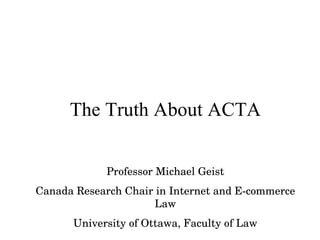The Truth About ACTA
- 1. The Truth About ACTA Professor Michael Geist Canada Research Chair in Internet and E-commerce Law University of Ottawa, Faculty of Law
- 3. Why The Concern? Mounting concern with ACTA is not âanti-copyrightâ or âpro-counterfeitingâ Shift in onus - why ACTA needed?
- 4. Why The Concern? Transparency Substantive Concerns Long-term Implications
- 5. Transparency ACTA is not the norm Trade agreement vs. IP agreement WIPO, UNESCO, UNCTAD all more transparent Implications extend beyond enforcement with key substantive provisions
- 6. Transparency Majority of countries support transparency 2005 - 2007 - total secrecy October 2007 - near total secrecy 2008 - location disclosures, statements 2009 - brief summaries, meeting agenda, NDA for insiders in U.S. 2010 Virtually all countries support transparency U.S., South Korea, Singapore now outliers Full text should be formally disclosed (leaks not good enough)
- 7. Transparency Public Statements and Transparency Statements at hearings/consultations may mislead Presence of three strikes â Mandatoryâ vs. Model Approach Statements in public documents may mislead Enforcement only, no substance Circumvention RMI Labels Commercial only Statutory damages De Minimis provision
- 8. Substantive Concerns Anti-circumvention provisions Renegotiation of WIPO Internet treaties Notice-and-Takedown Established standard when some countries reject Anti-camcording provisions Opposed in NZ, Australia, Switzerland Scope of the treaty Possible inclusion of patents
- 9. Substantive Concerns Statutory Damages Opens door to huge liability Extends to commercial and non-commercial Criminal Provisions Extend liability to non-commercial infringement â inciting, aiding and abettingâ certain offenses, including "at least in cases of willful trademark counterfeiting and copyright or related rights piracy on a commercial scale." De Minimis Provision Computer searches as commercial or non-commercial
- 10. Substantive Concerns Missing Flexibility Article 6 of the TRIPS (the first sale doctrine) Article 40 of the TRIPS (Control of anticompetitive practices) the Appendix to the Berne Convention Articles 10, 10bis, 11bis, and 13 of the Berne Convention Article 15 of the Rome Convention Fair Use/Fair Dealing
- 11. Substantive Concerns Injunction Powers â Each Party shall ensure . . . judicial authorities may issue against the infringer an injunction aimed at prohibiting the continuation of the infringement.â Missing many exceptions to this general rule for patents, copyright, trademark Institutional structure ACTA Oversight Council Secretariat Observers/new entrants Dispute resolution Technical assistance
- 12. Substantive Concerns Three Strikes/Graduated Response Current U.S. proposal conditions safe harbour on: â condition the application of the provision adopting and reasonably implementing a policy* to address the unauthorized storage or transmission of materials protected by copyright or related rightsâ * "an example of such a policy [ISP policy] is providing for the termination in appropriate circumstances of subscriptions and/or accounts on the service provider's system or network of repeat infringers.â Not mandatory, but clearly encourages 3 strikes is the only model raised in the text
- 13. Long-Term Implications Shift away from multilateral, open negotiations â plurilateralâ, closed approach raises real concerns in other areas Constitutional issues U.S. - executive agreement Europe - Lisbon Treaty Other countries - within the boundaries of current law? Ignoring other copyright issues Limitations and Exceptions work Treaty for the Blind Privacy Three strikes information sharing requirements Investigative cross-border information sharing
- 14. Long-Term Implications Undermining WIPO ACTA as a replacement for WIPO? Technical assistance, standard setting encroach on WIPO mandate Undermining WIPO Development Agenda Developing country goals ignored or stymied Developing countries face future pressure to conform Future ACTA Standard pressure Trade agreements Special 301/Watch lists Ineffective Approach to Counterfeiting Key countries excluded from ACTA process Real harms not addressed Reluctance to limit to counterfeiting
- 15. [email_address]











![Substantive Concerns Three Strikes/Graduated Response Current U.S. proposal conditions safe harbour on: â condition the application of the provision adopting and reasonably implementing a policy* to address the unauthorized storage or transmission of materials protected by copyright or related rightsâ * "an example of such a policy [ISP policy] is providing for the termination in appropriate circumstances of subscriptions and/or accounts on the service provider's system or network of repeat infringers.â Not mandatory, but clearly encourages 3 strikes is the only model raised in the text](https://image.slidesharecdn.com/actageistapril10-100407224654-phpapp01/85/The-Truth-About-ACTA-12-320.jpg)


![[email_address]](https://image.slidesharecdn.com/actageistapril10-100407224654-phpapp01/85/The-Truth-About-ACTA-15-320.jpg)